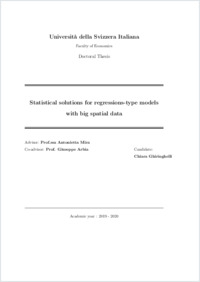Statistical solutions for regressions-type models with big spatial data
- Ghiringhelli, Chiara
- Mira, Antonietta (Degree supervisor)
- Arbia, Giuseppe (Degree committee member)
-
01.12.2020
77 p
Thèse de doctorat: Università della Svizzera italiana, 2020
Spatial econometric models
Big data
Recursive
Streaming
Computational
Hidden markov random fields
Non-stationarity
English
These last decades have witnessed an explosion of data collection and diffusion in all fields of human society. In many scientific fields researchers are becoming aware of a big data problem and of the need to manage it properly, combining the tools offered by statistics, computer, data science and informatics. This is particularly true for geo-located data, which can be collected in a comprehensive manner thanks to new technologies. Spatial econometric methods provide the right environment for spatial data modelling to identify causal mechanism and to assist empirically-supported decisions. However, such models become computationally prohibitive even with increasing power computing machines, when applied to very large datasets. The main features of big data are the so-called five V : volume, velocity, variety, veracity and value. All these characteristics can be easily detectable in the new geo-located data, instantly provided in a huge amount by smartphones, wearable, websites or other technologies. From this perspective, in this thesis, we aim to identify the limits of the current routines and the issues which could occur dealing with big spatial dataset. Since, we are specifically interested in the study of causal relationships between phenomena through regression-type models, our entire research focuses on the most common spatial econometric models: the Spatial Lag Model and the Spatial Error Model.
- Language
-
- English
- Classification
- Economics
- License
-
License undefined
- Identifiers
-
- RERO DOC 330125
- URN urn:nbn:ch:rero-006-119112
- ARK ark:/12658/srd1319084
- Persistent URL
- https://n2t.net/ark:/12658/srd1319084
Statistics
Document views: 396
File downloads:
- Texte intégral: 384
